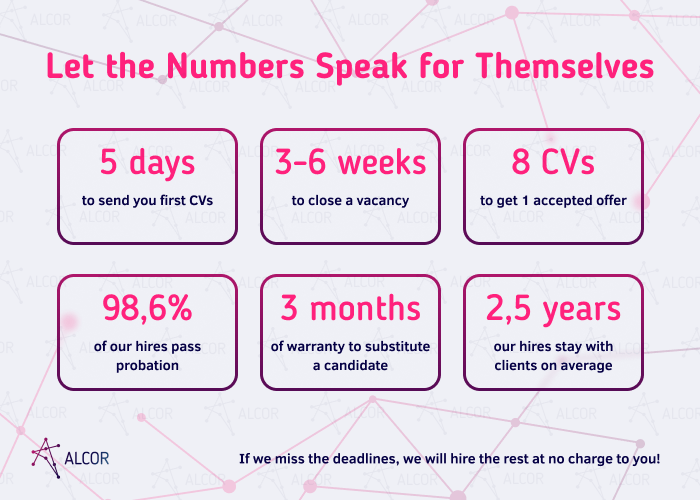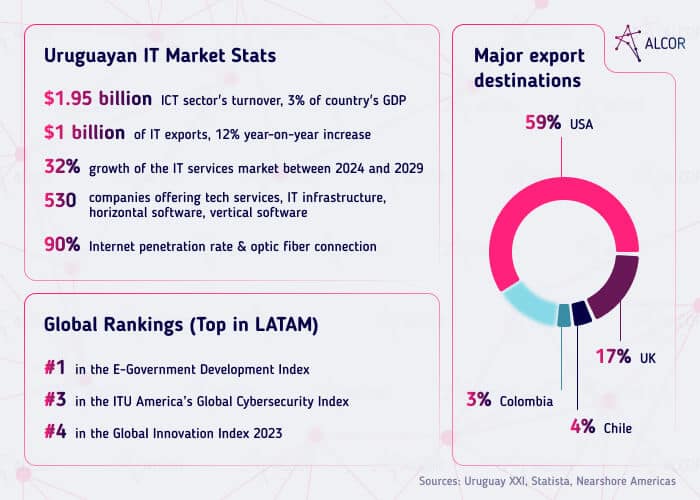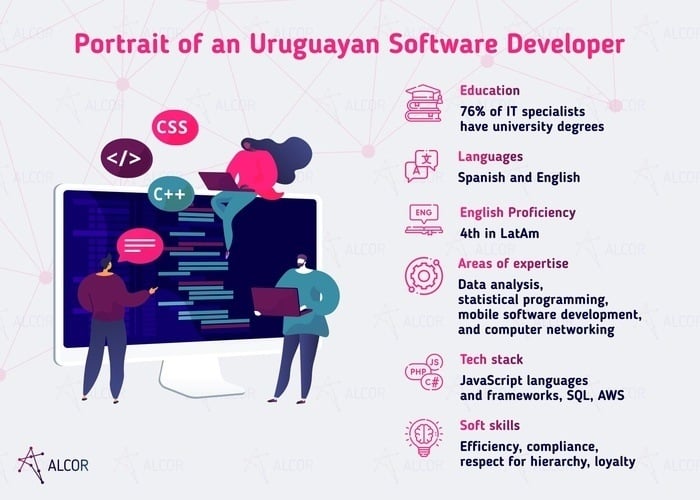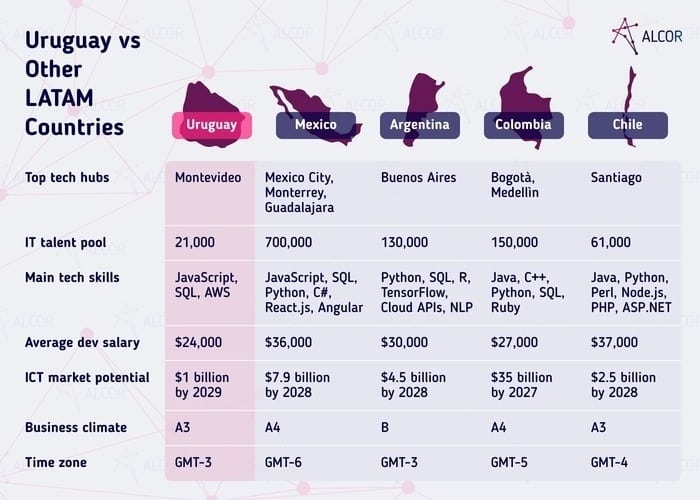A staggering $1 billion of IT exports, the highest indicator of software exports per capita in the world, vividly manifests the rising demand for outsourcing software development to Uruguay. International giants such as Microsoft, Amazon, Netflix, IBM, Sabre, and PwC are already reaping the benefits of this rapidly growing LATAM destination. So, what makes it so alluring?
I’m David Gomez, Alcor’s Recruitment Lead in LATAM. With our R&D center solution, we help tech companies scale their teams from 0 to 100 software developers. No legal entity is needed; enjoy 100% legal compliance and operational freedom in Latin America and Eastern Europe.

In this article, I’ll uncover the nitty-gritty details about strategic outsourcing to Uruguay: its market overview, reasons to opt for this destination, IT salary rates, developers’ skills, business models, and more. Let’s dive in!
Uruguayan IT Market Landscape
The ICT industry in Uruguay is a shining star of the Latin American region. Despite the country’s small size and much lower human resources compared to its gigantic neighbors Brazil and Argentina, Uruguay has become a top pick as an outsourcing destination.
According to the data from the Uruguayan Chamber of Information Technologies (CUTI), the local ICT sector‘s turnover hit an impressive $1.95 billion in 2021, making up 3% of Uruguay’s GDP. Meanwhile, IT services exports saw a dramatic 20% rise from 2021 to 2022. The main export destinations are the United States (59%), the United Kingdom (17%), Chile (4%), and Colombia (3%).
Looking ahead, Statista forecasts a 32% increase in the revenues of Uruguay’s IT services market between 2024 and 2029. Uruguay is home to 530 IT outsourcing companies that employ over 24,000 experts. They mostly specialize in IT services, tech infrastructure, horizontal and vertical software. Among the key sectors of IT services are fintech, cybersecurity, healthtech, agtech, and artificial intelligence. Notably, cybersecurity is a top sector in Uruguay, placing it in the top three of ITU America’s Global Cybersecurity Index.

Software Development in Uruguay: News & Trends
Here is a quick snapshot of how Uruguay is embracing innovation:
- The country’s telecommunication network is 100% digital, and the Internet penetration rate is 90%, one of the highest in South America.
- Uruguay is first in the E-Government Development Index and ranks 4th among the LATAM countries in the Global Innovation Index 2023.
- The local government is actively following the 2025 Digital Agenda to develop infrastructure, modernize systems, and implement 5G technology.
- Uruguay joined the Digital Nations group in 2018, contributing to the common goal of harnessing digital technology to improve citizens’ lives.
Now, let’s look closer at Uruguay’s booming tech sectors.
-
Fintech
Unlike the local heavyweights Brazil and Mexico, Uruguay achieved its fintech success through a robust entrepreneurial culture and a drive to expand globally. Financial inclusion law, the Uruguayan Fintech Chamber, and the Montevideo Fintech Forum have propelled the country’s fintech advancement.
Uruguay boasts over 63 fintech companies, with notable names such as Bankingly, Prometeo, Inswitch, MiFinanzas, Interir, and Paganza. Leading the charge is dLocal, the first fintech unicorn in the country. Forming successful partnerships with giants like Amazon, Uber, and Nike, dLocals’ total payment volumes are forecasted to increase by up to 50%, reaching a record $27 billion in 2024. Another promising fintech startup is Prometeo. It has already secured $13 million in venture capital from investors like PayPal Ventures and Samsung Next, aiming to add more services, expand user base, and enter new markets.
-
AI & IoT
Uruguay has been steadily moving to becoming one of the top LATAM hubs for innovation & AI development. Its journey began with the ambitious “One Laptop per Child” program, making Uruguay the first country in the world to bridge digital and educational gaps. It was further enhanced by the “Computational Thinking and Artificial Intelligence” program, which has already trained 80,000 students. Additionally, GitHub launched the “Git Commit Uruguay” program in 2023, focusing on teaching AI to high school students. As a result, Uruguay now leads the region in the number of people with AI skills per 10,000 inhabitants.
Regarding AI implementation initiatives, Microsoft’s AI & IoT Insider Lab in Montevideo stands out as a vivid example. This will be the first such lab in Latin America to help businesses solve various technological challenges and realize the full potential of AI and IoT. Another tech giant, Wellness TechGroup, in partnership with Narrowband Network Company, plans to provide IoT network coverage to 70,000 smart streetlights, promoting safety and reducing carbon emissions in Montevideo.
-
Agtech & FoodTech
The agricultural sector is a cornerstone of Uruguay’s economy, accounting for 7% of the GDP and 70% of the country’s total exports. Over the past decade, it has undergone significant modernization, heavily fueled by Agro en Punta, Uruguay’s first agro-export fair. Just last year, multiple projects of the agtech were showcased, including:
- metaBIX Biotech, AI-driven solution for predicting and treating diseases in plants, animals, and humans;
- Ucrop.it, a platform for registration and traceability of sustainable crops;
- Seedorina, Uruguay’s developer of high-precision sowing robots that reduce the preparation time for planting;
- Smartway, a startup that specializes in telemetry and IoT projects for agriculture, transportation, construction, and forestry.
Meanwhile, with $5 million support from the United States, the Uruguay Innovation Hub will foster the development of foodtech companies. Standouts in this sector include NocNoc and MonkeyLearn, which are making waves in the country and beyond.
Why Big Tech Outsource Software Development to Uruguay?
Elite IT talents
Quality over quantity — that’s the perfect description of the Uruguayan tech talent pool. Despite a population of only 3.5 million, the country boasts an impressive 21,000 IT professionals. According to the “Uruguay: IT Talent Report” by Microsoft and CUTI, the country has the highest density of people with tech skills (64 per 10,000 inhabitants) in South America. This is supported by an all-around STEM education, with 76% of software engineers holding university degrees, another reason to opt for software development outsourcing in Uruguay.
To boost Uruguay’s IT talent pool dynamic, the government has implemented several initiatives like the “Jóvenes a Programar,” “Sembrando TIC,” “Holberton,” and “SoyHenry,” collectively graduating over 5,000 tech graduates per year. Additionally, Uruguay launched a new law that aims to attract top tech talent from abroad to work for the local software development companies and, therefore, turn the country into a leading technology hub in LATAM. Continue reading to get even more insights about software developers in Uruguay.
Moderate Salaries
Cost-effectiveness is another appealing feature of Uruguayan software outsourcing. Let’s break it down with some quick figures. Imagine you are building an AI solution and need an AI Product Manager, Data Analyst, Data Scientist, ML/ AI Engineer, Data Engineer, and Full Stack Software Developer. Hiring this onshore AI team would cost you a whopping $897,000 annually. However, in Uruguay, you’d pay just $260,000. Impressive savings, don’t you think?
| Senior Position | Gross Annual Income, USD | |
| Uruguay | USA | |
| AI Product Manager | 52,000 | 130,000 |
| Data Analyst | 38,000 | 117,000 |
| Data Scientist | 43,000 | 126,000 |
| ML/ AI Engineer | 54,000 | 130,000 |
| Data Engineer | 40,000 | 134,000 |
| Full Stack Software Developer | 35,000 | 132,000 |
| Total | 260,000 | 897,000 |
Political & Economic Stability
Uruguay boasts the longest continuous democratic history in South America. The country successfully exercises democratic welfare, has a strong rule of law and a commitment to international agreements and norms, and has a low crime rate. The country enjoys over 16 years of stable economic growth, another reason to include Uruguay in the outsourcing strategy.
All these factors have led to renowned tech companies like Microsoft, Amazon, IBM, and Sabre doing software development in Uruguay. In addition, this country is recognized as an ideal destination for innovation and testing technologies, as new venture acceleration capabilities have been strengthened with the launch of NewLab and Microsoft Lab. To further maintain and enhance cooperation with the US tech companies and venture capital funds, Uruguay opened a consulate in San Francisco.
Tax Incentives
If you have been searching for a tax haven, IT outsourcing in Uruguay is your best bet! The local government has played its cards right, turning their country into an attractive place for business and investment. Firstly, they established economic free trade zones, where service, commercial, and industrial businesses can operate with 100% exemption from all taxes. Secondly, they implemented a non-double taxation rule. Foreigners who have tax residence in Uruguay can enjoy a tax holiday on their foreign-sourced income for ten years.
Meanwhile, global tech companies are 100% exempt from income tax on earnings from exporting software and related IT services. Those engaged in research and development activities can receive a 35% credit for R&D expenses conducted internally and 45% if executed in collaboration with certified tech centers or universities.
Software Developer Salaries in Uruguay vs USA
So, what’s the price tag to hire developers in Uruguay, you would ask. If you need to build a mobile app, such a developer of a senior level would charge about $63,000 per year. If you go with trendy roles like Blockchain Developer, Cloud Engineer or DevOps Developer in Uruguay, expect their annual reward to range from $62,000 to $65,000. QA experts like Automation QA JS Engineers, for instance, would cost a bit less — around $55,000 a year. If you need someone at a lead level, prepare to spend around $52,000 on a Product Manager, while the cost for an Engineering Manager can go as high as $90,000 per annum.
| Senior Position | Gross Annual Income, USD | |
| Uruguay | USA | |
| Mobile Developer | 63,000 | 112,000 |
| DevOps Developer | 65,000 | 136,000 |
| Cloud Engineer | 65,000 | 164,000 |
| Blockchain Developer | 62,000 | 132,000 |
| Automation QA JS Engineer | 55,000 | 98,000 |
When it comes to popular technologies, Java, Python, Node.JS, adn React.JS Developers are topping the list, demanding an average annual wage of $57,000-$60,000. Meanwhile, Angular and Golang Engineers are the most affordable, with annual salaries between $46,000 and $53,000.
| Senior Position | Gross Annual Income, USD | |
| Uruguay | USA | |
| Java | 60,000 | 114,000 |
| Python | 58,000 | 125,000 |
| C/C++ | 56,000 | 117,000 |
| Golang | 53,000 | 115,000 |
| .NET | 55,000 | 118,000 |
| Angular | 46,000 | 120,000 |
| Node.JS | 58,000 | 118,000 |
| React.JS | 57,000 | 120,000 |
To sum up, the average salary of a senior Uruguayan software developer is about 2 times lower than that of the one in the USA. By outsourcing to Uruguay, you can cut your labor expenses by 2x and allocate saved money on product enhancement and business development.
Uruguayan Software Developer Portrait
Education
Uruguay prioritizes education, boasting one of the highest literacy rates (98.7%) in Latin America. According to the “Uruguay: IT Talent Report,” the majority (61%) of IT experts in Uruguay have an undergraduate degree, 16% have a Master’s degree and 1% have a Doctorate degree. They acquire in-depth knowledge and practical STEM skills from such national universities as the University of the Republic, Technological University, University of Montevideo, and Catholic University of Uruguay.
Coding skills
Software engineers from Uruguay have a broad tech skill stack, from JavaScript languages, libraries, and frameworks to Python, .NET, Swift, Kotlin, and AWS. They even overtake Chile and Brazil, with the highest proportion of coders skilled in AI technologies. The Coursera Global Skills Report shows that 90% of developers from Uruguay are well-versed in data analysis while also being highly proficient in statistical programming (82%), mobile development (82%), and computer networking (80%).
Proficiency in foreign languages
Another strong side of Uruguayan programmers is their multilingual abilities. According to the English Proficiency Index 2023, Uruguay is in the top 40 worldwide and takes 4th place in Latin America. More specifically, 94% of Uruguayan coders are fluent in English. What does it mean for your tech business? Smooth, clear, and effective communication between your in-house team and coders in Uruguay. On top of that, your software developers from Uruguay may possess knowledge of the Portuguese language, as 51% of them have a strong command of it.
Soft skills
Despite preserving hierarchical values, Uruguay’s business realm is gradually adjusting to new working formats and demands of international companies. Communication, teamwork, adaptability, commitment, and leadership skills are more and more commonly found in Uruguayan IT professionals, according to El Observador. Still, proactiveness and time management are not the strongest suits of these developers. So, when you set sail to nearshore software development to Uruguay, try maintaining a friendly work environment, encouraging openness and individualism, and consider incorporating project management tools for timely task fulfillment.

Montevideo — IT Outsourcing Hub in Uruguay
Vibrant, versatile, and progressive — Montevideo is Uruguay’s capital and epicenter of its software development. It houses 85% of the tech workforce and serves as an innovation hub for local tech businesses and international enterprises. The small size of Montevideo’s ecosystem turned into a potent advantage, boosting active networking and knowledge sharing among companies and developers alike. LATU Technology Park, the Pando Science and Technology Park, the Cerro Industrial Technology Park, and Paysandú Innova only fueled the proactive spirit of Montevideo’s tech community.
Montevideo is now in Latin America’s top 10 entrepreneurial cities, hosting 97% of Uruguay’s startups, including stars such as DLocal, Nocnoc, Meitre, Bunker DB, GeneXus, and Datanomik. Such an iridescent entrepreneurial environment even caught the attention of the well-known Accelerator 500 Startup. As a part of the Montevideo Accelerator Program, 500 Startups has brought Silicon Valley expertise to help local entrepreneurs get seed capital investment and internationalize. With tech giants like IBM, Deloitte, TCS, and Google already engaged in research and development activities in Montevideo, IT recruitment in Uruguay is set to be on an upswing.
Uruguay vs Other LATAM Outsourcing Destinations
Uruguay vs Mexico
Mexico is renowned as the second-largest tech market in Latin America, with its valuation reaching a whopping $28 billion. The tech talent pool here is more extensive than the one in Uruguay, amounting to 700,000 IT professionals. But STEM education is where the two destinations show strong dedication, with their software developers proficient in JavaScript and Python. Mexico boasts 3 ripe IT hubs, namely Mexico City, Monterrey, and Guadalajara, with 38 IT clusters, 20 tech parks, and 440 startups. However, challenges persist in its business climate and political stability, which currently lag behind the more favorable environment found in Uruguay.
Uruguay vs Colombia
Another frequently picked location to outsource to Latin America is Colombia, with a talent pool of 150,000 tech experts. Its ICT market is forecasted to reach $35 billion by 2027. Colombian software developers are well-versed in Java, Python, C++, SQL, and Ruby while excelling in data analysis and computer networking, something that they share with Uruguayan programmers. Another common feature between the two locations is the impact of fintech advancement. 15% of 1,500 startups in the country are fintech companies, with the prominent ones being Rappi, Bold, and Treinta. Most startups are located in blooming tech centers such as Bogotá, Medellín, and Cali.
Uruguay vs Argentina
Argentina is the third biggest tech market in Latin America, having 115,000 IT professionals and being home to 11 of the 34 unicorns in the region. Its software developers are #3 in LATAM for technology skills and are particularly good at Python, SQL, TensorFlow, and NLP. Just like Uruguayan counterparts, Argentine programmers excel at English, ranking #1 in the region, which is one of the critical reasons for putting Argentina in the outsourcing strategy of multiple US tech companies. The vibrant IT hubs Buenos Aires, Còrdoba, and Mendoza host 19 commercial structures, 3,800 tech enterprises, and 1,107 startups. Similarly to Uruguay, the Argentinian IT market is making strides in e-government development, IoT, and AI technologies.
Uruguay vs Chile
Talent-wise, Chile hasn’t outpaced Uruguay that much, providing access to 61,000 software developers. Its government has been making decisive steps towards meeting the high demand for skilled talents, implementing various educational programs like “Digital Talent Up,” which Uruguay also shares. Another area of constant development is the startup and entrepreneurial ecosystem, which received a 64% boost in 2023 and was supported by the “Chile Digital 2035.” Among its developed tech hubs are Santiago, Valparaíso, and Concepción, which together account for 303 startups. Like Uruguay, Chile is generous with incentives, providing tech businesses with a 35% tax credit on R&D investment and a 65% deduction of R&D investment from taxable income.

Risks and Limitations of IT Outsourcing to Uruguay
Unclear pricing
There is a common belief that outsourcing software development is a cost-effective approach. At first glance, it seems true since outsourcing vendors’ rates are usually lower than the expenses of building the development team from scratch. However, reality is more complex than it appears. It’s not uncommon for outsourcing providers to offer vague pricing models with hidden costs. You may end up with an invoice that includes fees for unnecessary or unused services like procurement of additional equipment and software, extra tech training, or fixes and adjustments.
Questionable quality
“Buy cheap, buy twice” is another way to describe the consequences of opting for outsourcing. The heart of this problem is in team dedication. Picture this: when you have your own team of programmers, they are not just clocking in hours — they are fully invested, always willing to go the extra mile to make a top-notch software product. On the other hand, developers of the outsourced provider juggle multiple projects simultaneously, treating yours as just another one on their to-do list. Their divided attention may cause bugs and errors, impairing the product.
Data security concerns
Ensuring data protection nowadays is not a piece of the cake, and entrusting sensitive data to a third-party provider can put it at even higher risk. You may have limited or no control over the outsourcing provider’s security practices, which could mean weaker protection measures than those maintained in-house. Data breaches may occur from external cyber-attacks and internal threats within the outsourcing provider’s company. Another issue is the danger of intellectual property theft, which may happen due to data misuse or unauthorized access.
IT Outstaffing in Uruguay
What about alternatives to IT outsourcing to Uruguay? One is tech outstaffing, which operates on a similar principle: delegating the software development process to a third-party vendor. However, in this case, tech companies can lease a team of programmers while maintaining control over software development and team management. Among other advantages are the flexibility of scaling up or down the team and the absence of admin tasks, such as purchasing hardware or leasing an office space.
On the flip side, there are lots of drawbacks. Firstly, there is a lack of team dedication. Just like with IT outsourcing, you are not the official employer of software developers. In case you decide to keep them, especially when seeking investment, you’d have to pay a fortune to buy out those coders. IP protection and potential overpricing are other alarming concerns related of IT outstaffing.
Better than Outsourcing Software Development to Uruguay
What if expanding to Uruguay without outsourcing risks and pitfalls was possible? Luckily, there is a solution explicitly devised for tech companies like yours! It’s a software R&D center provided by Alcor. You may think that comprehensive solutions cost an arm and a leg, but in reality, building an R&D center can save you up to 40% on expenses. Other benefits include:
- Absence of buy-out fees: the development team is yours from day 1.
- 100% transparency: only direct salaries and a pay-as-you-go approach.
- High-quality developers: average tenure is 2.5 years.
- 100% compensation: any fines caused by our mistake are covered.
- Dedicated account manager: get 24/7 assistance.
What’s in it?
Alcor’s software R&D center solution includes full-cycle tech recruitment, Employer of Record services, and operational support. Our 40 IT recruiters cover the entire hiring process, from devising ideal candidate profiles and EVP to CV screening, interviewing, and working with offers/counteroffers. Once ideal candidates are hired, we employ them according to the local labor laws and legislation and take care of all the documentation, payroll, tax payments, and benefits management. We can assist you with real estate leasing, hardware procurements, and other back-office operations if you need extra services.

How does it work?
To expand abroad swiftly and smoothly, a US-based company, People.ai, chose Alcor’s one-stop-shop solution. We took the operational burden off their shoulders, covering tech recruitment, monthly payroll, office leasing and negotiations, legal matters to comply with domestic and foreign laws, tax payments, and hardware procurements. As a result of our fruitful cooperation, People.ai got a fully backed R&D hub in 1 month, a team of 25 top-notch IT gems with rare skills, and 100% control and operational freedom.
Achieve similar results as People.ai, BigCommerce, Dotmatics, and ThredUP. Fill out the form below to start your expansion journey today!
References on Outsourcing to Uruguay
- Uruguay XXI news
- ICT sector in Uruguay ICT Report
- Statista
- ITU America’s Global Cybersecurity Index
- UN E-Government Knowledge Base
- Global Innovation Index 2023
- Wilson Center news
- Reuters
- TechCrunch
- GitHub
- ITS International
- Food and Agriculture Organization of the UN
- LATAM Republic
- Microsoft & CUTI 2023. Uruguay: Talent Report on the IT Sector
- Ernst & Young
- Uruguay XXI: Global Services Report
- Coursera Global Skills Report 2024
- EF English Proficiency Index
- El Observador
- Startup Blink 2024
- GlobalData
- International Trade Administration: Country Commercial Guides
